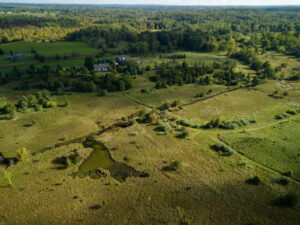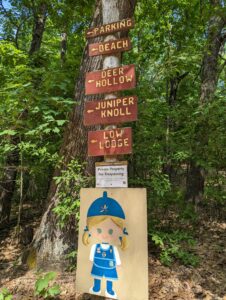
Aerial view of a fen on protected property in Jackson County. Photo credit – Eric Bronson, University of Michigan Media
Sixteen years ago, Legacy Land Conservancy formally extended its service area to include Jackson County. In response to increased landowner interest and recognition that the area possesses some of the world’s rarest landscapes, the team confidently set out on a new concentrated land protection effort in the county.
It was a bold venture. And although we had a decades-long foundation of strong land protection and expertise on our side, we knew it would be a long and difficult road. With almost no land protection framework, partnerships, or funding in place at the local level, we began organizing in the area from the ground up.
We spent the first few years learning the lay of the land, identifying and listening to community leaders, and making connections. It wasn’t glamorous work. It couldn’t be counted on the books as acres protected. It was invisible, but absolutely necessary, work.
While we worked diligently to establish the necessary infrastructure for future Legacy-held land protection opportunities, we continued to play a role in partner-based acquisition wins along the way. Legacy’s team was instrumental in protecting hundreds of acres throughout Jackson County by assisting partners like the Michigan Department of Natural Resources with complex projects already in process involving the Waterloo Recreation Area and surrounding lands, as well as Watkins Lake State Park.

Legacy conservation easement private property sign affixed to a pole at the Camp O’ the Hills Girl Scouts property.
Gradually, our patience and commitment to the process started paying off. Between 2016 and 2023, we went from mainly assisting partners to acquiring six Legacy-held conservation easements (in only seven years!) protecting a total of 290 acres–including the Camp O’ the Hills Girl Scout property and a rare fen property in Norvell Township.
To date we have helped protect almost 2,000 acres in Jackson County–and we are just hitting our stride! The land team is actively moving 600 acres of land projects through our acquisition process, in addition to fielding a dozen new land inquiries in the last year. Plans are in the works to bring one well-known Jackson-area fen into our care. And in the near future, we will secure our first preserve along the Grand River as well as close on a high-quality wetland conservation easement within the River Raisin Watershed.
But one piece of the land protection puzzle in Jackson County that has proven to be more elusive than the rest is funding. To protect land, it takes a diverse mosaic of funding solutions through local, state, and federal sources, in addition to individuals and private grantors. Legacy is still working to identify individuals, partners, grantors, and innovative ways to establish local funding sources that will help fund conservation work in the County.
Thankfully, we’re gaining traction on this piece now, too. Recently, we expanded our relationship with the Jackson Community Foundation (JCF) to deepen our community ties with the people who care immensely about this county. In October 2024 we held our first planned giving and donor-advised fund event in partnership with JCF at the Country Club of Jackson, connecting our two forever-based missions.
Establishing these types of relationships is crucial. In order to purchase the next wetland conservation easement in our pipeline and permanently protect the land, it will cost a total of $166,200. Because Legacy doesn’t have access to millage-based funding sources like we do in Washtenaw County, we have to rely on a small selection of state and federal funding opportunities, Jackson County focused foundations, and private donors. We’ve had some good news recently though, and we were awarded a federal award that will help fund a large portion of this particular easement. And thanks to a generous gift from a local Jackson couple, we only need to raise $9,200 more to close this project!
Land protection takes time. And although the process has been more difficult than anticipated, we’re celebrating all our wins–no matter how big or small–along the way!

 RSS Feed
RSS Feed
I have 96 acres in Jackson County that I’m considering having protected. Can someone contact me? I have several questions.
Thank you. Ken
Because every conservation project is unique, the best first step is a conversation. Thanks for reaching out Ken–someone on our land protection staff will be in touch with you soon.